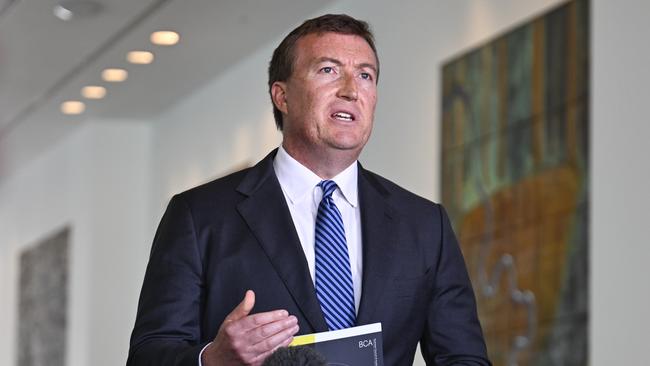‘We can’t see the vision’: corporate leaders bemoan policy drought
Business leaders have criticised the Albanese government’s fourth federal budget for its lack of vision, ‘modest’ measures and lack of support for small businesses.

Business leaders have criticised the Albanese government’s fourth federal budget for its lack of vision, “modest” measures and lack of support for small businesses.
Business Council of Australia chief executive Bran Black said the budget deficit of $42.1bn showed the nation was “living beyond our means”, cautioning that spending was at its highest since 1985-86 at 27 per cent of GDP. After Jim Chalmers handed down a pre-election budget containing tax cuts for workers of about $5 a week, Mr Black said he was supportive of the cost-of-living measure but more needed to be done to drive private sector growth and boost the economy.
“The budget forecasts slightly better days ahead for economic growth, with GDP increasing to 2.25 per cent next year, which is welcome, however we have not seen the policies or reform to drive investment and business-led growth now or for the years ahead,” Mr Black said. “Personal income and company taxes make up around two thirds of the budget revenue and we welcome more relief to taxpayers, however we need a long-term solution for bracket creep.”
ACCI chief executive Andrew McKellar criticised the budget, saying it “lacks strategy and vision”, and the return to deficit would damage the nation’s capacity to respond to future economic headwinds. “This is a budget which seems preoccupied with the short term, lacking a longer-term strategy to drive stronger economic growth by strengthening productivity and competitiveness,” he said.
“As expected, the underlying cash balance projection shows a return to ongoing structural deficits for the foreseeable future.” Minerals Council of Australia chief executive Tania Constable said the budget represented another “missed opportunity” to strengthen the economy, warning that the nation’s ability to respond to global challenges had been undermined and its fiscal position was “deteriorating”.
“Australia’s ability to respond effectively to global trade pressures and tariffs has been severely compromised by domestic policies that have eroded our industrial base and competitiveness,” Ms Constable said.
“Rather than implementing urgently needed reforms to strengthen productivity, attract business investment, and control spending, the government has missed yet another opportunity, continuing to rely on mining revenues to cover uncontrolled expenditure.”
Australian Industry Group chief executive Innes Willox said the budget contained “modest” measures that would not ultimately “shift the economic dial”.
“The budget demonstrates the trough the economy is now in, with another significant downgrade in the growth forecast for the current financial year, down from 2 per cent in last year’s budget to 1.5 per cent in this budget,” he said.
The Australian Council of Trade Unions welcomed the tax cuts. “Tax cuts, combined with wages continuing to rise, means this budget delivers higher incomes for workers and their families,” ACTU president Michele O’Neil said. She also lent its support to Dr Chalmers’ shake-up of non-compete clauses, which will enable workers to move more-freely between jobs.



To join the conversation, please log in. Don't have an account? Register
Join the conversation, you are commenting as Logout